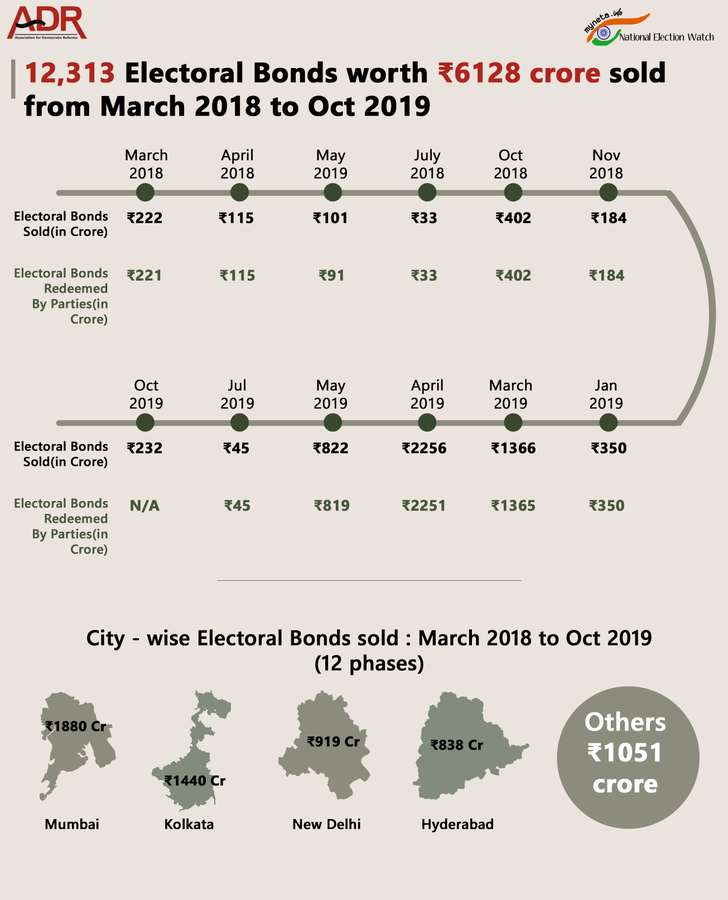12,313 electoral bonds worth Rs. 6128 crore sold from March 2018 to Oct 2019#electoralbond
Supreme Court in April had agreed to examine the constitutional validity of Electoral Bonds, which were opposed by Election Commission of India as well as ADR. No hearing has taken place since then

From March, 2018 till October, 2019 the State Bank of India has sold Electoral Bonds worth ₹6,128 Crore, according to information made available by the Association for Democratic Reforms (ADR).
In October, 2019 alone bonds worth ₹232 Crore were sold as against ₹45 Crore in July. Earlier, during the general election to the Lok Sabha, bonds worth over three thousand Crore had been sold. The bulk of the money is believed to have gone to the BJP.
However, the SBI in response to an RTI query by a Pune based activist, Vihar Durve, had informed that till May, 2019, electoral bonds worth ₹4,794 Crore had been sold since January, 2019.
Significantly, bulk of the bonds, over five thousand Crore Rupees, have been sold in just four cities, namely Mumbai, Kolkata, New Delhi and Hyderabad. The rest of the country together have bought just ₹1051 Crore.
The Government had told the Supreme Court that the State Bank of India would not disclose details of the buyers of the bonds to anyone unless a court calls for them or government agencies require the details in course of any investigation. Effectively, it meant that the Government and the ruling party would know who buy the bonds.
During riveting discussions in the Supreme Court in April, the three following points of view had emerged:
Justice Deepak Gupta: There is right of the donor to have secrecy and right of the voter to know their funders. It is very important aspect of democracy for the voter to know as to who funds their party.
Attorney General, K.K. Venugopal: It is not voter's concern to know where the money comes from. Transparency cannot be looked as a mantra. What is the realities of the country. This is a scheme that will eliminate black money from the elections The voters have a right to know what? Why are they bothered about where the money comes from?
Activist & lawyer Prashant Bhushan: The scheme of electoral bonds has nothing in it whatsoever to curb the black money. All that you have done through the scheme is to open a banking channel also to donate anonymously. Earlier you could donate cash to the party, now you can donate through bank also.
Political donations received by political parties from different sources were as follows:
The Election Commission in April had informed the court that it had written two letters — one dated March 15, 2017, and the other May 26 — expressing its concern at the amendments to the Finance Act, 2017, and Section 29C of the Representation of People Act, 1951, facilitating the bonds.
When the Bonds were launched in March, 2018, electoral bonds worth ₹222 Crore had been issued, of which ₹210 Crore had gone to the Bharatiya Janata Party.
The electoral bonds, which can be bought by individuals as well as corporate entities and then donated to parties, do not bear the name of the donor. The anonymity has fuelled fears that high-net-worth individuals or rich companies can influence the outcome of elections by pumping money to select parties without the identity of the donor being revealed.



